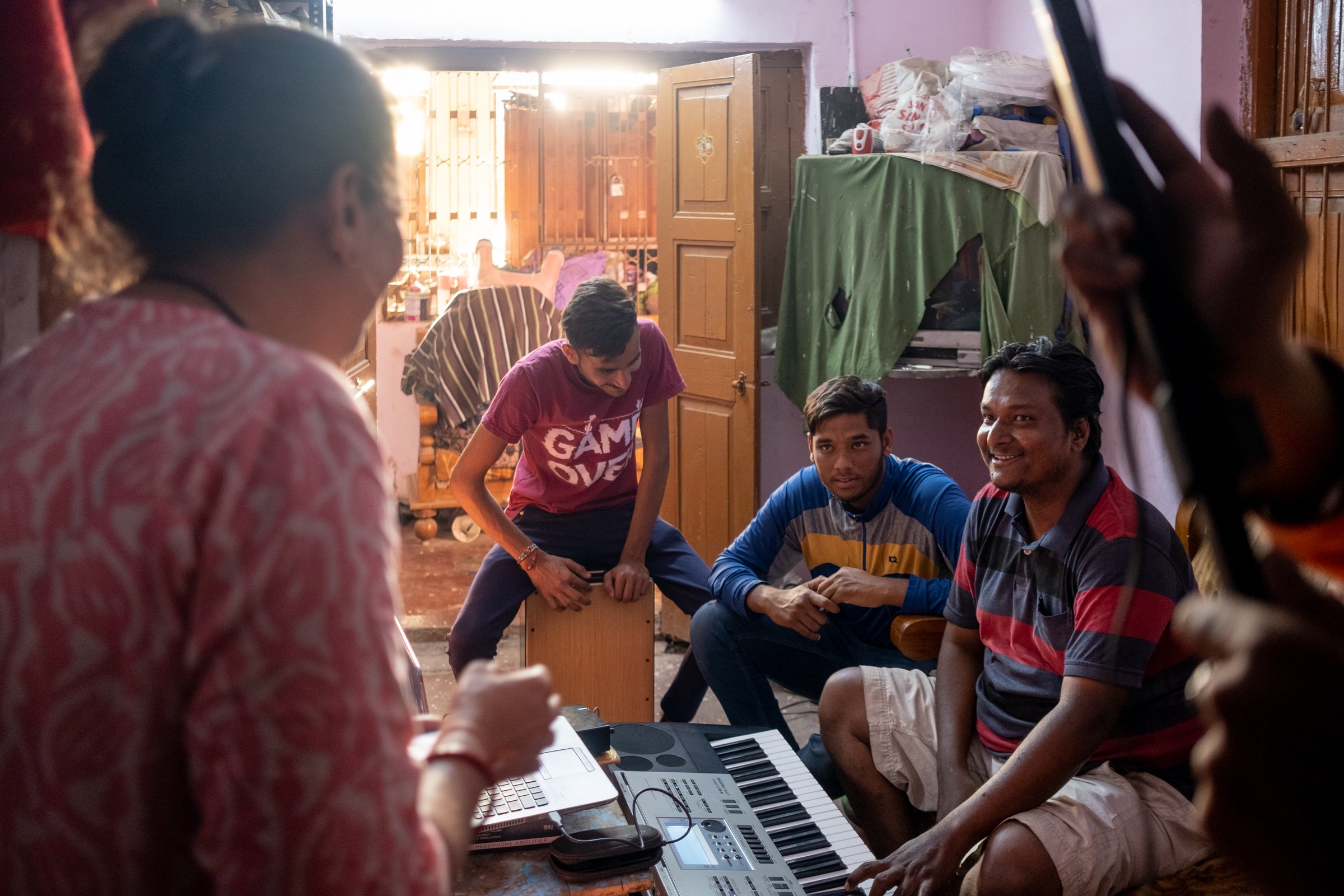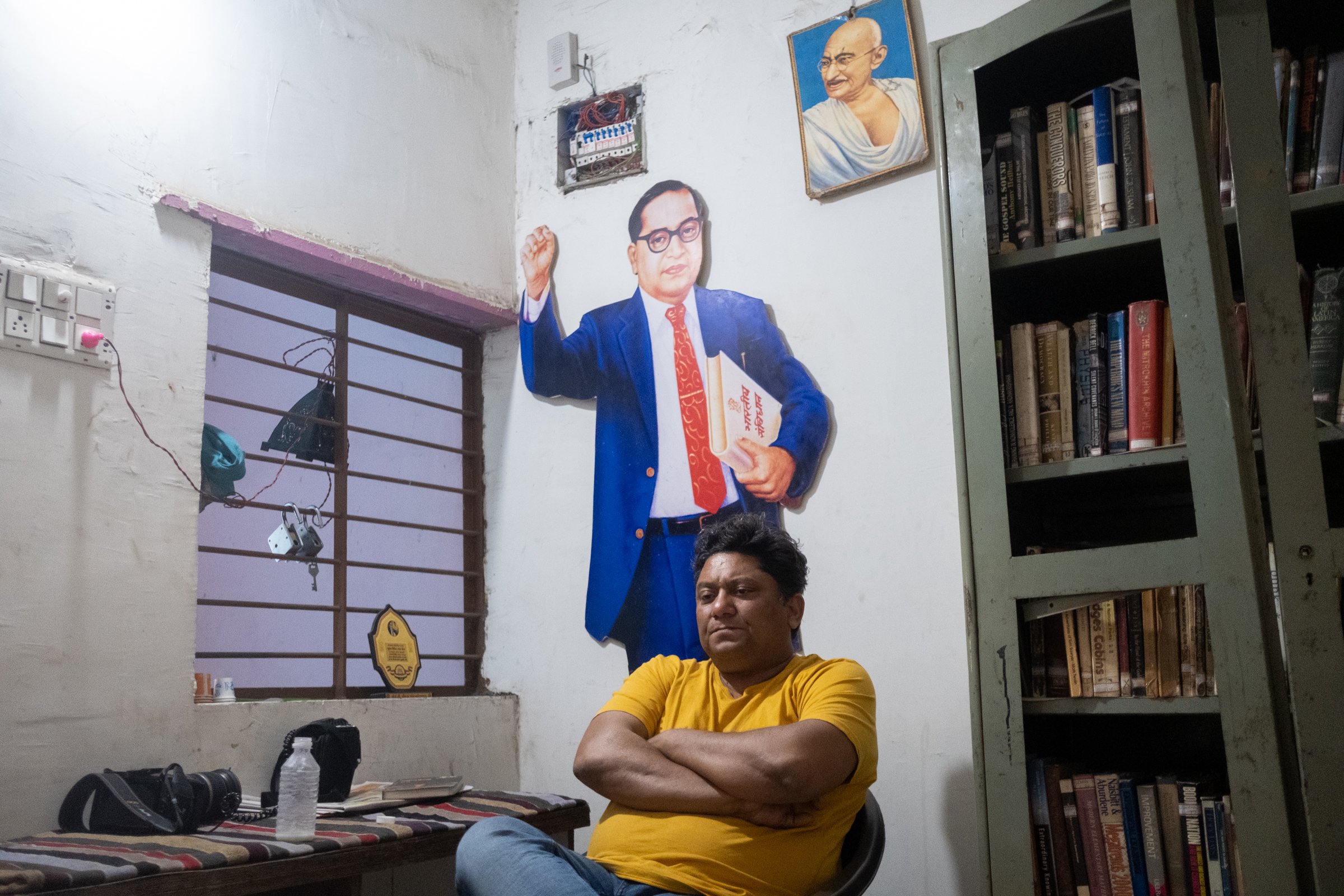Mhara Pichchar (Our Film)
49 mins | 2023 | India, UK
In response to the COVID-19 pandemic, a collective of indigenous artists belonging to India’s ‘ex-criminal’ De-notified Tribes and associated with Budhan Theatre, decided to produce video podcasts of the impact of the pandemic on the margins. This process was an effort to generate memory against processes of collective amnesia; and to usher indigenous communities to the digital space in a post-pandemic context, where the digital has become an essential component of our cultural and economic life. This film tells the story of the makers, who did not stop recording despite losing members of their own family along the way.
Mhara Pichchar combines storytelling with music, poetry performance and narration to bring to the fore issues and debates that are absent in mainstream media. The film traverses several strands covering the personal and artistic trajectories of the protagonists, using behind-the-scenes interviews of the creators and footage from the podcast as the narrative trope.
Director’s Statement
Mhara Pichchar (Our Film) is a deeply personal film. As the world grappled with the impact of the first and second waves of the COVID-19 pandemic, our team of theatre artists felt compelled to give voice to the marginalised communities that were overlooked by mainstream media and government institutions. At a time when physical spaces were shut down, we turned to the digital realm to amplify the voices of those who were facing immense challenges and document their stories of survival.
As a filmmaker, I took it upon myself to train the Budhan Theatre team in the art of filmmaking. The journey was a fascinating one, as these individuals had never imagined themselves as filmmakers. Our protagonists reside in humble dwellings and lead lives that society often stigmatises, labelling them "Born Criminals." They inhabit congested ghettos, yet the theatrewalas-turned-filmmakers' determination to tell stories that matter, remained unwavering.
These aspirant filmmakers learned the craft of filmmaking through the act of creating this film.
Our film unfolds with Ruchika Chhara, an actress from our theatre group and an aspiring filmmaker. The narrative goes on to explore the personal journeys and spaces of the filmmakers themselves, examining why they were driven to share the stories of others despite their own hardships during the pandemic. They employed personal interviews, songs, dances, skits, poetry, and more to convey the narratives they believed needed to be shared. Tragically, we lost Ruchika to a lung-related illness during the making of this film.
At a time when dominant forces threaten to rewrite the narrative around the COVID-19 pandemic, through Mhara Pichchar, we invite the audience to bear witness to the haunting realities of the pandemic and embrace the call for a more compassionate and resilient future.
Directed and edited by
Dakxin Chhara
Produced by
Alice Tilche
Nomad Movies Pvt Ltd
Funded by
Arts and Humanities Research Council, UK
Supported by
The School of Museum Studies, University of Leicester, UK
Associated Director
Anshul Agrawal
Director of Photography
Anshul Agrawal
Background Music
Shahraaz Khan
Sound Design
Niranjan Rasne
Colorist
Anshul Agrawal
Executive Producer
Dakxin Chhara
Photographer
Ankita Jain
Research Consultant
Akshay Khanna
Distribution Consultant
Yashodara
Additional Cameramen
Kushal Batunge
Keyur Bajrange
Sound Recordist
Ashutosh Patel
Assistant Directors and Editors
Keyur Tanna
Keyur Bajrange
Screenings and Awards
Official selection
20th International Social Justice Film Festival (India)
Official selection
12th Dharamshala International Film Festival 2023 (India)
Official selection
12th Chennai International Documentary and Short Film Festival 2024 (India)
Official selection
Habitat Film Festival 2024 (2024)
Official selection
7th South Asian Short Film Festival (SASFF)
Official selection
Society for Visual Anthropology Film and Media Festival 2024






As a filmmaker, Dakxin has directed 70 fiction and non-fiction films on various development and political issues in India. His films are widely screened in film festivals and universities in India and abroad. He is the winner of the South Asia documentary film award Jeevika (2005) for his film ‘Fight for Survival’. His film on De-notified Tribes of India entitled ‘Birth 1871’, was screened at 11 universities in the USA and Canada and in 5 universities across the UK. From 2008 to 2010, he worked as an associate director with renowned documentary filmmaker Rakesh Sharma on three films around the political issues of Gujarat - Chet’ta Rejo, Khedu Mora Re, Kesariyo Kono. As a theatre director, he has also written and directed 11 plays and supervised 46 theatre productions of Budhan Theatre and performed in more than 700 shows in different parts of India. He has conducted a number of theatre workshops for community development in marginalised communities, schools, colleges and institutions, trained more than 300 actors and founded a number of theatre groups. He coordinated and organised Gujarat’s biggest community theatre festival called Ahmedabad Theatre Festival (ATF) in 2012.
Dakxin is the author of two books, ‘Budhan Bolta Hai’ (2010) published in Hindi and the play ‘Budhan’, published in Hindi and English by Bhasha Research and Publication Centre. His academic publications have appeared in Antipode: A Journal of Radical Geography, Liffey Press Ireland, Seminar India, Bhasha Research and Publication Centre, Penguin India, Malayalam Manorama, Budhan Newsletter and Padmagandha Publication. He has presented papers in many reputed national and international conferences in India, USA, UK, Canada and has given talks on theatre and film at the United Nations in 2007.
Director
Dakxinkumar Bajrange is an award-winning filmmaker, playwright, director and activist from the Chhara De-notified Tribe of Ahmedabad, in western India. He received the Ford Foundation International Fellowship (2010-11) to study Theatre and Global Development at the University of Leeds, UK. His book ‘Budhan Bolta Hai’ (Budhan Speaks) was awarded the first prize for "Mahatma Gandhi Best Creative Writing on Human rights" by National Human Rights Commission (NHRC) in 2010-11. He is a recipient of the Rajiv Gandhi Arts Fellowship (2004-05) and Bhasha Fellowship (2002-03) to study art forms of nomadic and de-notified communities in Gujarat. Currently, he works as the Artistic Director at Budhan Theatre, a community theatre group of the Chhara de-notified tribe of Gujarat. He is also the founding director of Nomad Movies Pvt. Ltd, which provides production and post-production facilities to make fiction and non-fiction films.
Producer
Alice Tilche is a lecturer in Art, Anthropology and Museum Studies at the University of Leicester, UK. Her research at the intersection of art and activism employs visual, collaborative and arts-based methods to research social transformations. Recent research includes work on the cultural politics of indigeneity, migration, nationalism and most recently Covid-19. Her new book Adivasi Art and Activism: curation in a nationalist age was published with Washington University Press in 2020.
Alice has collaborated with Dakxin Bajrange on a series of film projects including the films Sundarana (2011) and Broken Gods (2019), which have been selected for a number of international film festivals. Alice and Dakxin are currently collaborating on a series of visual art and research projects looking at the experiences of the pandemic among some of India's most marginal indigenous communities. Alice’s work has been funded by the Wenner-Gren Foundation, the British Academy, the Leverhulme Trust and the Arts and Humanities Research Council UK among others.



